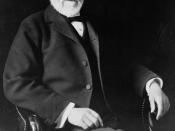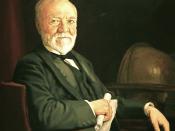Andrew Carnegie is a legend in industry. He was He was born in Scotland in 1835. He came to America and started his working career in a cotton mill as a bobbin boy. He was a hard worker, and quickly was promoted through the ranks of Western Union and the Pennsylvania Railroad Company. In 1865, he quit and started his own business, the famous and notorious Carnegie Steel Company. His company was responsible for starting the steel industry in Pittsburgh, and he and his company left their imprint on industry and big business for years to come. He retired at the age of 65 and sold his company to J.P Morgan for 480 million dollars.
Carnegie has been shown as a cutthroat businessman and his company as a ruthless monopoly in the history books, yet he was also a philanthropist who donated over $350 million during his lifetime.
He founded and supported many libraries that are still used today. He wanted to help those who had fallen upon hard times and misfortune without giving them handouts, because "you cannot push anyone up a ladder unless he is willing to climb up a little." (Carnegie) Instead, he put the opportunity within reach. "Carnegie's philanthropy was intended to empower ordinary men and women by making knowledge and ideas conveniently available to them. He is best remembered for providing the financial incentives to build almost two thousand free public libraries across the United States." (Paytonpapers.org)
Though he is known as a cutthroat businessman, there are few that will speak badly of him. Though he systematically put competitors out of business, he also helped schools and built libraries for mill towns to help people lift themselves out of poverty. "He established in the Scottish Universities a trust of $10,000,000 for assisting boys...


